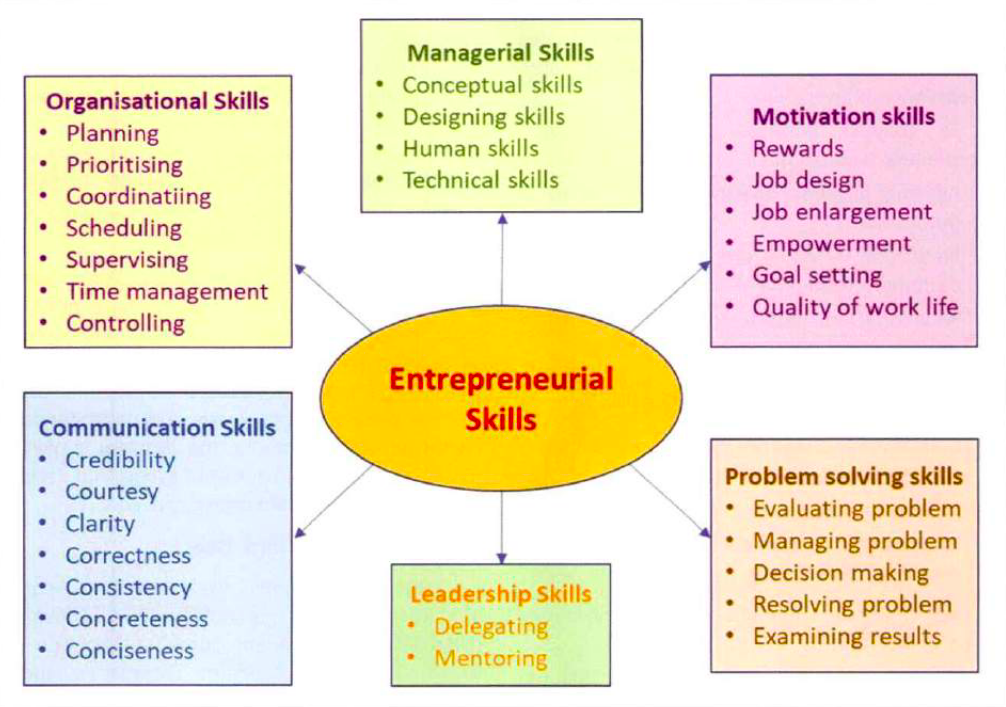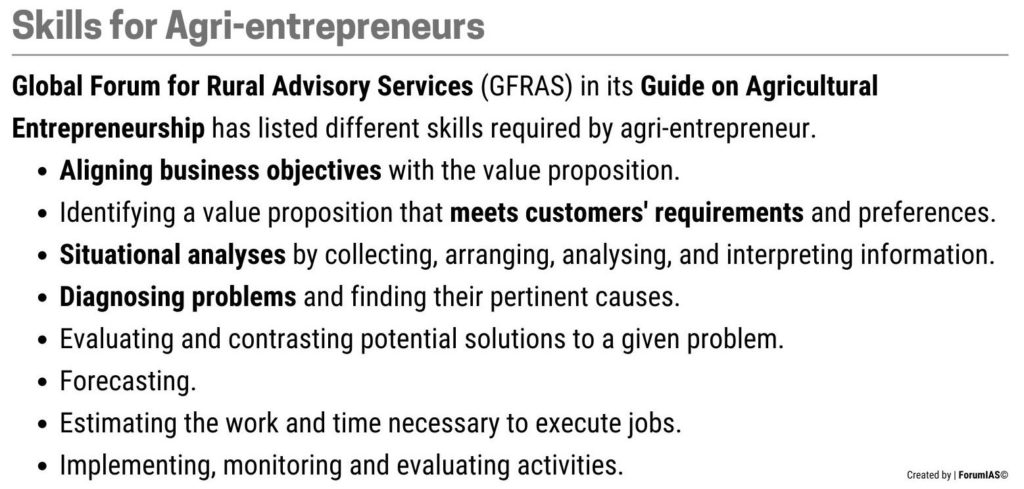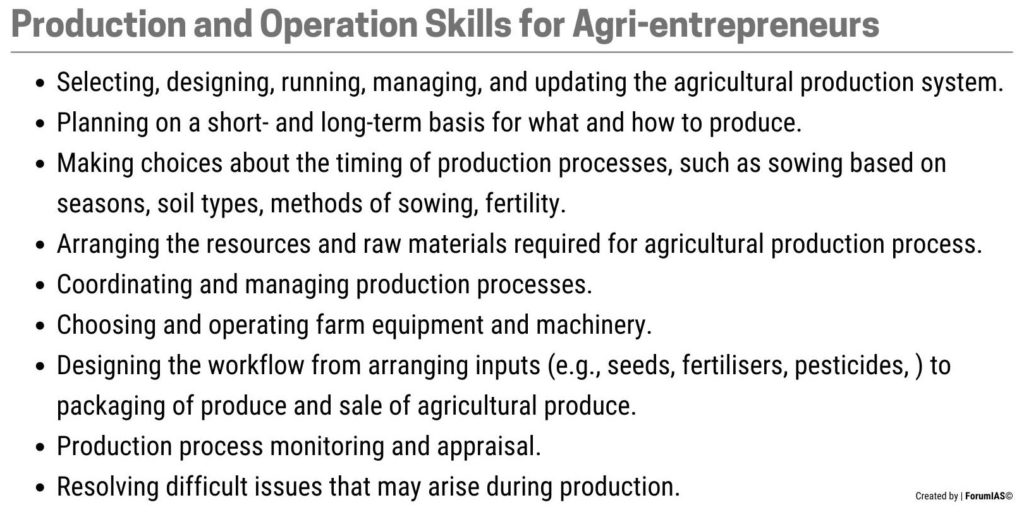ForumIAS announcing GS Foundation Program for UPSC CSE 2025-26 from 19 April. Click Here for more information.
Contents
| For 7PM Editorial Archives click HERE → |
Introduction
Agriculture offers several opportunities for entrepreneurship. There are many new prospects in the agribusiness sector like packaging, provision of raw materials, exports of agricultural products and other related industries. High-skilled workers’ perspectives are changing as a result of increased micro-financing, relaxed government regulations, access to cutting-edge technology and guidance in agri-related fields. As a result, may youngsters are choosing to work for themselves in agriculture and allied sectors and exploring new opportunities in agri-entrepreneurship.
Concept of Entrepreneurship
The term ‘Entrepreneur’ is derived from French verb ‘Entreprendre’ which means ‘to undertake’. In early 16th century, the Frenchmen who led military expeditions were referred as entrepreneurs. Joseph Schumpeter (an Austrian Economist) popularised the term Entrepreneurship in 1930s. He defined entrepreneur as an individual who introduces something new in the economy – a method of production not yet tested, a product with which consumers are not yet familiar, a new source of raw material or of new market.
Entrepreneurship is the process of identifying opportunities in market place, arranging the resources required for pursuing these opportunities (i.e., convert an idea into a product or service to market) and investing the resources to exploit the opportunities for a long-term gain. Entrepreneurs are being considered an important instrument for initiating and sustaining socio-economic development.
Entrepreneurs perform several functions which are broadly categorised as innovation, risk bearing, organisation and management function. It encompasses idea generation, determining objectives, raising funds, procurement of machinery and raw materials, market survey, determination of form of enterprise, manpower recruitment and operating the enterprise.
Agri-Entrepreneurship
Agriculture used to be viewed as a low-tech industry dominated by small farm enterprises that were mostly concerned with improving the ongoing practices rather than looking for innovations to doing new things. However, after the economic liberalisation and a rapidly changing society, this situation has changed dramatically over the last two decades. Agricultural enterprises must adjust to market instability, shifting consumer preferences, rigorous environmental restrictions, new product quality standards, sustainable food standards, and other factors. Due to these changes entrepreneurship and more innovations are now possible.
Agricultural entrepreneurs undertake business related to agricultural activities; some entrepreneurial areas in agriculture are farming, product marketing, inputs marketing, and processing of agricultural produce. Agriculture offers tremendous opportunity for entrepreneurship, but this potential can only be realised through efficient management of agri-elements like soil, seed, water, and market demands.
Advantages of Agri-Entrepreneurship
Agri-entrepreneurship has the ability to contribute to social and economic development, including job creation, poverty reduction, improved health and nutrition, increased food security, and improving rural economy.
The solution to reducing the burden of agriculture, generating employment opportunities for rural youth, preventing rural-to-urban migration, raising the national income, sustaining industrial development in rural areas, and easing pressure on urban areas can be achieved through agri-entrepreneurship. It helps small farmers become more productive profitable, and marketable on a local, national, and global scale. It encourages business opportunities in both urban and rural areas, accelerates growth, and diversifies income.
Opportunities in Agri-Entrepreneurship
The scope and potential in agri-entrepreneurship have greatly increased as a result of the WTO’s policy reforms, globalisation of trade and agriculture as well as national policy reforms. This has increased corporate interest in this industry.
Agriculture offers several opportunities for entrepreneurship.
Agro-Produce Processing Units: In these facilities, no new products are manufactured; instead, only agricultural produce is processed e.g., mills for grinding grains (rice, wheat), pulses, etc.
Agro-Produce Manufacturing Facilities: In these facilities, completely new goods are created using agricultural products as the primary raw material like bakeries, straw board factories, and sugar factories.
Agro-Input Manufacturing facilities: Items are produced for either mechanising agriculture or expanding manufacturing facilities e.g., fertiliser production units, agricultural tool manufacturing units, etc.
Agro-Service Centres: These include the stores and repair facilities for farm equipment, implement, and machinery.
Miscellaneous Areas: The establishment of apiaries, feed processing facilities, seed processing facilities, mushroom production facilities, goat rearing, organic vegetable and fruit retail outlets, bamboo plantations, may be possible in these areas.
Factors of Entrepreneurship
Several factors contribute to the success of an enterprise, including the entrepreneur’s organisational, marketing, and human relations strategies. Market, methods, team, and company are some of the influential factors of entrepreneurial success.
Four distinct factors influence entrepreneurship: economic development, culture, technological development, and education. These factors may have an impact on the emergence of entrepreneurship in both positive and negative ways. The economic environment has the most immediate and direct effect on entrepreneurial activity.
Economic factors are capital, labour, raw materials, market and infrastructure.
Social factors include family background, education, attitude of the society, and political support.
Psychological factors refer to motives, need for achievement, status and respect.
Core Competencies and Skills
Specific traits and abilities are needed to pursue agri-entrepreneurship, and these may be acquired through training, and preparation. Planning, implementation, and control are the three key facets of farm management that need knowledge and proficiency from farmer-entrepreneurs. They also need information on input supply, financial services, transportation, packaging, marketing, and consulting services, as well as primary production, harvesting, processing, wholesaling, and retailing.
Essential entrepreneurial attributes for an agri-entrepreneur are initiative, ambition, concentrated problem-solving, creative thinking, taking chances, flexibility and adaptation, interpersonal skills, networking, and a willingness to learn.
Need for Achievement: Entrepreneurs have a strong drive to succeed in their business and in life. Their aspirations go well beyond merely reaching one target; instead, they are always striving to surpass it.
Technical Expertise: An entrepreneur is fully knowledgeable about all the technical aspects of his/her enterprise including technology, operations, finances, or market dynamics. Entrepreneurs are curious about new things. They make the effort and take decision to look into the unforeseen.
Innovativeness: Entrepreneurs don’t always adhere to the traditional guidelines. They are constantly looking for fresh opportunities to expand. They build new things and come up with ideas through imagining solutions to issues.
Independence: An entrepreneur frequently finds it challenging to work in a regulated setting due to their desire for freedom to make decisions. Entrepreneurs require independence in their job and decision-making.
Risk Bearing Ability: Entrepreneurship is inextricably linked to risk. Entrepreneurs who take reasonable risks (moderate risk/calculated risk) outperform those who take excessive or no risks at all in terms of returns on their assets. The entrepreneur accepts future uncertainty while reducing risk by preparation, skill development, and research.
Leadership Ability: Entrepreneurs exemplify leadership traits. They have good communication skills, are good decision-makers, good planners, organisers, and motivators who take the initiative to carry out plans and are goal-oriented.
Human Relations Skills: In order to gain customers’ trust for their goods and services, entrepreneurs need to get along well with their customers. To manage their business profitably, they must also maintain strong ties with their employees.
Diligent: Entrepreneurs are very hard-working and put up a lot of effort to see a business venture through to success. They continuously work toward achievement and are aware that there is no replacement for putting in a lot of effort.
Self-confidence: Entrepreneurs have faith in their abilities to face uncertainties.
Flexibility: Entrepreneurs need to be adaptable to shifting markets, trends, technology, laws, and regulatory frameworks, as well as shifting economic conditions.
Source: Kurukshetra October 2022
To be successful in an agri-entrepreneurship, a farmer must be able to blend their managerial, technical, and entrepreneurial skills in practice. The three key technical aspects that demand expertise are managing inputs, production, and marketing. Entrepreneurial and technical competencies must be supported with managerial competencies in diagnosis, planning, organising, leading, and managing.
Market analysis is one of the important functions of an agri-entrepreneur who needs to have several skills for it such as critical thinking, system analysis, operations analysis, decision-making, problem- solving, coordination, and communication abilities. An agri-entrepreneur would require negotiating skills in order to negotiate with all stakeholders and arriving at a common ground, reasonably addressing concerns of all parties. This avoids log-jam and ensure continuity.
Skill Development Initiatives
Various Government bodies and institutes are engaged in training, consultancy, research, etc. in order to promote entrepreneurship and skill development. These include: (a) National Institute of Micro, Small and Medium Enterprise (NIMSME), Hyderabad under Ministry of Micro, Small and Medium Enterprises; (b) Indian Institute of Entrepreneurship (lIE), Guwahati; (c) National Institute for Entrepreneurship and Small Business Development (NIESBUD), Noida; (d) National Skill Development Corporation; (e) National Skill Development Agency; (f) National Skill Development Fund under Ministry of Skill Development and Entrepreneurship.
NABARD has been partner of Government in implementing schemes for agri- entrepreneurship like: (a) New Agricultural Marketing Infrastructure (AMI) sub scheme of Integrated Scheme for Agricultural Marketing (ISAM); (b) Agri Clinics and Agri Business Centres Scheme (ACABC); (c) National Livestock Mission Entrepreneurship Development and Employment Generation (NLM- EDEG); (d) Dairy Entrepreneurship Development Scheme (DEDS); (e) Commercial production units of organic inputs – National Project on Organic Farming (NPOF).
Ministry of Agriculture and Farmers’ Welfare, Government of India under revamped Rashtriya Krishi Vikas Yoiana has launched a new Scheme named Innovation and Agri-Entrepreneurship Development to promote agri-entrepreneurship and agribusiness by providing financial support and nurturing the incubation ecosystem.
Initiative for Development of Entrepreneurs in Agriculture (IDEA) under (NEDFL Schemes) Ministry of Development of North Eastern Region intends to promote agri-business ventures in the North East Region and assist in establishing agri-business as a profitable venture. It also provides gainful employment opportunities and makes available supplementary sources of input supply and services.
Way Forward
Agri-entrepreneurship is essential to transform subsistence activities into profitable business ventures. Aspiring agri-entrepreneurs must be equipped with appropriate resources in order to enable them to exploit opportunities in the agriculture and allied sectors. Extension and agro-advisories can be utilized to promote group entrepreneurship by organising group of entrepreneurs and establishing linkages along the value chain. This can help create new livelihood opportunities, ensuring improvement in farm productivity and raising rural income levels, thus ensuring a balanced and inclusive growth.
Source: Kurukshetra October 2022







